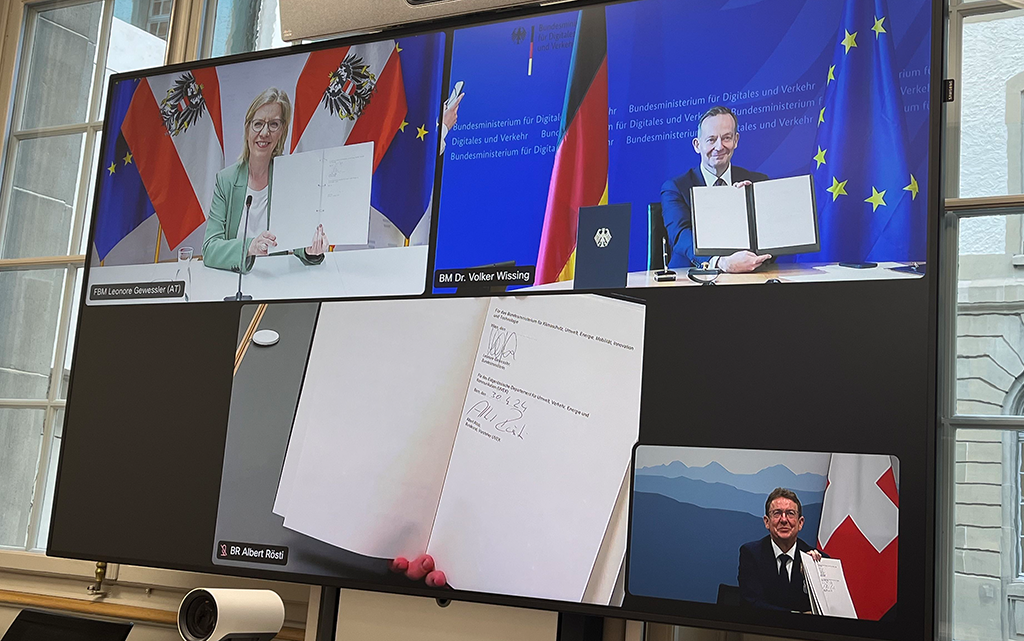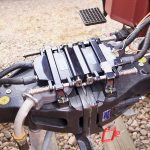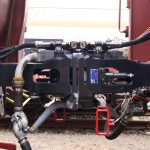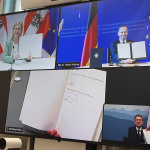 Austria, Germany and Switzerland have signed a position paper calling the EU to provide more funding for digital automatic coupling – DAC programme. The document – “The DAC is coming!” was signed online by the German Federal Minister for digital and transport, Volker Wissing, the Austrian federal minister for climate action, environment, energy, mobility, innovation and technology, Leonore Gewessler, and Swiss Federal Councillor and the Head of the Federal Department of the Environment, Transport, Energy and Communications, Albert Rösti.
Austria, Germany and Switzerland have signed a position paper calling the EU to provide more funding for digital automatic coupling – DAC programme. The document – “The DAC is coming!” was signed online by the German Federal Minister for digital and transport, Volker Wissing, the Austrian federal minister for climate action, environment, energy, mobility, innovation and technology, Leonore Gewessler, and Swiss Federal Councillor and the Head of the Federal Department of the Environment, Transport, Energy and Communications, Albert Rösti.
“The faster the technology is used across the board, the sooner we will benefit – economically and ecologically. DAC is a real game-changer and will make a decisive contribution to shifting more goods to rail through greater efficiency. But one thing is clear: without the EU it won’t work. It must financially support the conversion to the DAC,” the German minister said.
Around half of all freight trains running in Germany cross the federal border at least once during their journey. Rail freight transport can therefore only function smoothly if there are European standards and compatible processes. “That is why the introduction of the DAC is a European project and can only succeed if everyone involved agrees on common processes and standards,” the German Ministry underlines.
In April, DB Cargo has announced that its DAC system entered customer use following a two-year period of practical tests.
The Austrian Government is also open to co-finance the DAC programme, but a pan-European introduction of the new technology with the participation of all European countries is required, Climate Protection Minister Leonore Gewessler says. “Together with our partners from Germany and Switzerland, we have signed a decisive initiative to introduce the Digital Automatic Coupling (DAC) in the European rail freight transport. This technology is not only a step towards more advanced mobility solutions, but also an essential building block for greater climate protection in order to achieve the goals of the EU Green Deal. Now the European Union is asked to present a common European plan including a financing concept for the DAC programme so that the appropriate trust can be created in this project,” Minister Leonore Gewessler says.
ÖBB and its freight transport subsidiary Rail Cargo Group play a leading role in the development and introduction of the DAC. In addition to leading the European DAC Delivery Programme (EDDP), where intensive work is being done on DAC migration plans, cost-benefit assessments and funding needs, the ÖBB Group is also the largest partner in the European research project on DAC within Europe’s Rail Joint Undertaking (EU Rail). This is where the technical development, testing and demonstration of DAC technology, including applications, takes place.
“With the introduction of the DAC, we will achieve significant improvements in productivity and thus competitiveness and safety. It is the basis for the digitalisation of the entire train production up to and including more route capacity. We have been working intensively for years on the market-ready implementation of the DAC – with demonstrator and pre-series trains. Our goal is to develop a robust and affordable system. In the European DAC programme, we are also committed to ensuring that everyone involved can convert or equip their freight wagons with the DAC as soon as possible, taking into account different initial situations and financial conditions,” Clemens Först, CEO of the ÖBB Rail Cargo Group said.
Extensive research and development work is currently underway at a European and national level in order to make the DAC ready for series production. It is intended to gradually replace the conventional screw coupling in Europe from 2026 in several migration stages. In addition to previous test trains, the DAC is to be implemented in demonstrators from 2026 to continue to form the basis for the so-called pre-deployment phase. During this phase, around 100 DAC pilot trains will run across Europe in order to collect important findings across Europe on regionally specific and technical challenges as well as on different operational scenarios and, above all, reliability of the system. The system is expected to roll out by 2030.
In order to achieve the necessary shift in freight transport, it is important for rail freight transport in Europe to become more competitive and efficient. Shifting the transport of goods from road to rail is crucial to achieving the climate goals in transport in Austria and Europe. Around 30% of domestic CO2 emissions come from traffic – and the trend is rising sharply. In freight transport, transit trucks are one of the main emitters. Transporting one ton of freight by train, on the other hand, is 30 times more climate-friendly.
The Swiss Federal Council passed its rail freight digitalisation message to the Parliament for future-proof rail freight transport. A key element is the introduction of the digital automatic coupling technology. The Federal Council wants to provide CHF 180 million (EUR 184.2 million) for the conversion of Swiss rolling stock to the DAC and underlines that the system should be carried out in line with developments in Europe. “The three countries commit to introducing and co-financing the DAC as quickly as possible. They are calling on the EU Commission to also take a leadership role, particularly by adopting a concept for EU-wide co-financing of the DAC. The other EU states should also prepare financing solutions. Switzerland, Germany and Austria are also calling on the industry to develop the necessary technical and operational foundations for the rapid and cost-effective introduction of the DAC,” the Swiss Federal Office of Transport (FOT) says.
The Federal Councilor Albert Rösti and Federal Transport Minister Volker Wissing will organise a DAC event on May 22, 2024 as part of the International Transport Forum in Leipzig in order to discuss the importance of a timely introduction of the DAC together with other EU states.
The DAC4EU consortium was established to conduct trials on digital automatic coupling. The consortium includes six public and private freight transport companies: DB Cargo (leader, Germany), RCG (Austria), SBB Cargo (Switzerland) as well as the freight wagon owner Ermewa, GATX Rail Europe and VTG are on board. The German Ministry of Transport (BMDV) has financed the project with EUR 13 million from June 2020 to December 2022. BMDV has commissioned an extension of the project until June 2024 and is financing this with further EUR 7 million. The goal is to support the development of the couplings towards production-ready technical and operational performance of the prototype coupling systems and their functional capability in the various operating sites and different countries of Europe.
The majority of freight wagons in rail traffic in Europe are currently coupled manually by means of screw couplings. DAC allows wagons to be automatically coupled together with their air brake pipes as well as power and data lines for the freight wagons. DAC is a key component of digitalising and automating rail freight traffic as it allows for universal power and data lines across all freight wagons.
If DAC is fully deployed, all the 400.000 – 450.000 freight wagons in Europe will be equipped with the new technology which in addition will increase infrastructure capacity.
Share on:






